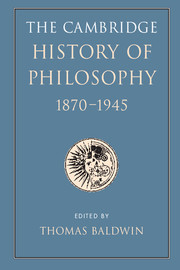Book contents
- Frontmatter
- Contents
- List of contributors
- Introduction
- I 1870–1914
- II 1914–1945
- 8 Logic and philosophy: the analytic programme
- 9 The diversity of philosophy
- 32 The continuing idealist tradition
- 33 Transformations in speculative philosophy
- 34 Realism, naturalism, and pragmatism
- 35 French Catholic philosophy
- 36 Spanish philosophy
- 37 The phenomenological movement
- 38 Heidegger
- 39 Latin american philosophy
- 40 Japanese philosophy
- 10 Knowledge, language, and the end of metaphysics
- 11 Philosophy and the exact sciences
- 12 Mind and its place in nature
- 13 Philosophy and social science
- 14 Ethics, religion, and the arts
- 15 Law and politics
- Biobibliographical appendix
- Bibliography
- INDEX
- References
34 - Realism, naturalism, and pragmatism
from 9 - The diversity of philosophy
Published online by Cambridge University Press: 28 March 2008
- Frontmatter
- Contents
- List of contributors
- Introduction
- I 1870–1914
- II 1914–1945
- 8 Logic and philosophy: the analytic programme
- 9 The diversity of philosophy
- 32 The continuing idealist tradition
- 33 Transformations in speculative philosophy
- 34 Realism, naturalism, and pragmatism
- 35 French Catholic philosophy
- 36 Spanish philosophy
- 37 The phenomenological movement
- 38 Heidegger
- 39 Latin american philosophy
- 40 Japanese philosophy
- 10 Knowledge, language, and the end of metaphysics
- 11 Philosophy and the exact sciences
- 12 Mind and its place in nature
- 13 Philosophy and social science
- 14 Ethics, religion, and the arts
- 15 Law and politics
- Biobibliographical appendix
- Bibliography
- INDEX
- References
Summary
The reaction to nineteenth-century idealism took many forms. On the epistemological front several species of realism reasserted themselves while on the metaphysical stage a variety of naturalistic tempers made their appearances. In addition, pragmatism, in a guise that purported to transcend the terms of the traditional polemic, came into the ascendancy. While there clearly were major European versions of these various reactions to idealism, and more specifically British versions (Moore, Russell, and F. C. S. Schiller), the concerted reaction to idealism in terms of realism, naturalism, and pragmatism was a decidedly American phenomenon.
REALISMS
The most powerful American spokesperson for the philosophical perspective of idealism was Josiah Royce. From his position at Harvard his version of absolute idealism exerted considerable influence on American thought. The initial realist reaction to this idealist hegemony took a cooperative form when six philosophers (Ralph Barton Perry, Edwin Holt, William Pepperell Montague, Walter Pitkin, Edward Spaulding, and Walter Marvin) published in 1910 ‘A Program and First Platform of Six Realists’ followed in 1912 by a cooperative volume entitled The New Realism (Holt et al. 1912) for which each provided an essay. This volume gave rise to the designation ‘The New Realists’ for this group of six.
Although these six differed on many particulars, they did concur on several matters of philosophical style and epistemological substance that characterized their reaction to absolute idealism. Procedurally, they endorsed a cooperative and piecemeal approach to philosophical problems and they were constitutionally inclined to a closeness of analysis that would prepare the way for later philosophical tendencies. Substantively, they were in agreement on several epistemological stances that constituted the centrepieces of their ‘refutation of idealism’.
- Type
- Chapter
- Information
- The Cambridge History of Philosophy 1870–1945 , pp. 449 - 460Publisher: Cambridge University PressPrint publication year: 2003



